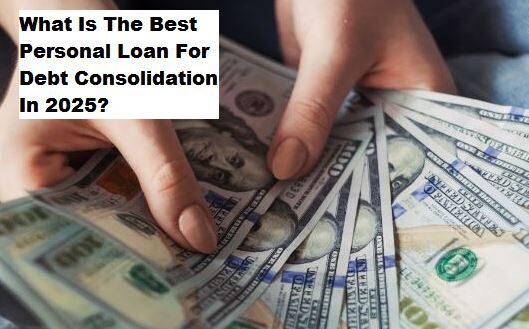What Is The Best Personal Loan For Debt Consolidation In 2025: Debt consolidation is a popular strategy for managing multiple debts by combining them into one loan. By doing this, individuals can simplify their monthly payments and, in some cases, reduce their overall interest rates. However, choosing the right loan for debt consolidation can be challenging. With so many lenders, interest rates, and loan terms available, finding the best personal loan for debt consolidation in 2025 requires a thorough understanding of your financial situation and the various loan options.
In recent years, more people have found themselves struggling with debt due to unforeseen circumstances, like medical bills, job loss, or unexpected expenses. If you’re drowning in high-interest debts from credit cards or loans, debt consolidation can offer a solution that helps you regain control of your finances. But it’s important to choose the right loan to make the most of this opportunity.
This guide will walk you through the essential aspects of consolidating debt in 2025. From identifying the best companies offering personal loans for debt consolidation to understanding credit score requirements, we will cover everything you need to know. So, what is the best personal loan for debt consolidation in 2025? Let’s dive in and explore your options.
Also, READ
How Do Payday Loans Work And Are They Worth It?
What Are The Different Types Of Loans Available For Small Businesses
Which Company Is Best For Debt Consolidation?
When looking for the best company for debt consolidation, it’s essential to focus on a few key factors. These include loan terms, interest rates, and customer service. Some of the top companies offering personal loans for debt consolidation in 2025 include SoFi, LendingClub, and LightStream.
SoFi is a popular choice due to its low-interest rates and flexible terms. They are known for offering competitive rates to borrowers with good credit scores. SoFi also provides an easy online application process, and their customer service is highly rated. They offer a range of loan amounts, and you can choose repayment terms that work for your budget.
LendingClub, on the other hand, offers personal loans for debt consolidation through peer-to-peer lending. This means that instead of borrowing from a traditional bank, you’ll be borrowing from individual investors. LendingClub offers competitive rates, especially for borrowers with fair credit. However, their fees may be higher than those of other companies, so it’s important to read the fine print before committing.
LightStream is another excellent option, offering low-interest rates and a fast application process. If you have a strong credit score, you may qualify for one of the lowest rates available. Their loans are ideal for borrowers who are looking to consolidate larger amounts of debt and need flexible terms.
What Is A Good Interest Rate For Debt Consolidation?
The interest rate on a personal loan for debt consolidation plays a critical role in determining the total cost of the loan. A good interest rate can help you save money over time by reducing the amount you pay in interest charges. In 2025, a competitive interest rate for a debt consolidation loan ranges between 5% and 20%, depending on your credit score and financial situation.
For borrowers with excellent credit (usually a credit score of 750 or higher), it’s possible to secure a loan with an interest rate as low as 5% or even lower. These low rates are typically offered by online lenders like SoFi, LightStream, and Marcus by Goldman Sachs. On the other hand, if your credit score is lower, you may be offered higher interest rates, possibly up to 20% or more.
It’s important to note that the interest rate is not the only factor to consider when choosing a loan. Fees, loan terms, and other charges can significantly affect the overall cost of the loan. Always compare offers from multiple lenders to find the best deal. Additionally, be aware of introductory offers with lower rates that may increase after a specific period. The best interest rate for debt consolidation is one that fits your credit profile and financial goals.
What Is The Best Option For Consolidating Debt?

The best option for consolidating debt will vary depending on your unique financial situation. Personal loans, balance transfer credit cards, and home equity loans are all popular methods of consolidating debt, each with its pros and cons.
A personal loan is often the best option for those who need to consolidate high-interest credit card debt or unsecured loans. It provides the benefit of a fixed interest rate and predictable monthly payments, making it easier to manage your finances. If you qualify for a low-interest personal loan, it can save you a significant amount of money over time, especially when compared to the high-interest rates on credit cards.
Another option is using a balance transfer credit card. These cards often offer introductory 0% APR for a certain period, typically 12 to 18 months. If you have a plan to pay off your debt within the promotional period, this can be a cost-effective way to consolidate debt. However, balance transfer cards usually charge a fee of 3% to 5% of the transferred amount, and the interest rate increases significantly once the introductory period ends.
Lastly, a home equity loan or line of credit can be a viable option if you own a home and have substantial equity. These loans tend to have lower interest rates because they are secured by your property. However, this also means you risk losing your home if you’re unable to repay the loan. For most people, a personal loan is the safest and most straightforward option for consolidating debt.
What Credit Score Is Needed For A Debt Consolidation Loan?
Your credit score plays a significant role in determining the interest rate and loan amount you qualify for when applying for a debt consolidation loan. While the specific credit score required varies by lender, most personal loan lenders prefer a credit score of at least 650 to 700 for debt consolidation loans.
For the best rates and terms, a credit score of 750 or higher is ideal. With a strong credit score, you’ll have a better chance of qualifying for lower interest rates, which can save you a significant amount of money over the life of the loan. However, if your credit score is below 650, you may still be able to qualify for a loan, but expect to pay a higher interest rate.
In some cases, lenders may be willing to work with borrowers who have less-than-perfect credit. If you have a low credit score, it’s important to consider ways to improve your credit before applying for a debt consolidation loan. Paying down existing debt, correcting errors on your credit report, and making on-time payments can help improve your credit score over time.
Is It Worth Getting A Personal Loan To Consolidate Debt?
Whether it’s worth getting a personal loan to consolidate debt depends on your specific financial circumstances. Personal loans for debt consolidation can offer several benefits, such as lower interest rates, fixed monthly payments, and a clear timeline for paying off your debt. These factors can make managing your debt much easier and less stressful.
However, it’s important to ensure that you’re truly consolidating your debt in a way that helps your financial situation. If you take out a personal loan and continue to rack up credit card debt, you may end up in a worse position than before. It’s essential to create a budget, cut unnecessary expenses, and avoid taking on more debt while you pay off your consolidation loan.
In many cases, a personal loan for debt consolidation is worth it if you have a clear plan for managing your finances and paying off your debt. But if you’re uncertain about your ability to stick to a budget or need help managing your debt, you may want to explore other options, such as credit counseling or debt management programs.
What Is A Hardship Loan?
A hardship loan is a type of loan designed for people facing financial difficulties due to circumstances like job loss, medical expenses, or other unexpected hardships. These loans are typically easier to qualify for than traditional loans because they take into account the borrower’s financial challenges.
Hardship loans can be used to consolidate debt, cover medical expenses, or provide relief during a financial emergency. However, these loans often come with higher interest rates and fees compared to other types of loans. It’s essential to carefully evaluate the terms and conditions before accepting a hardship loan, as it could put you in a worse financial position if you’re unable to make the required payments.
Hardship loans can be a helpful option for those struggling with immediate financial crises. However, they are not a long-term solution to debt problems. If you’re facing ongoing financial struggles, it’s important to explore other options for managing and reducing your debt.
Conclusion
In 2025, the best personal loan for debt consolidation will depend on several factors, including your credit score, financial goals, and the terms offered by lenders. When choosing a loan, consider factors such as interest rates, fees, and repayment terms. Top lenders like SoFi, LendingClub, and LightStream offer competitive rates and flexible options for borrowers with various credit profiles.
A personal loan for debt consolidation can be an effective way to simplify your debt and reduce interest costs. However, it’s essential to ensure that you’re not taking on more debt or overextending yourself financially. By carefully evaluating your options and making a solid repayment plan, you can improve your financial situation and work toward a debt-free future.






